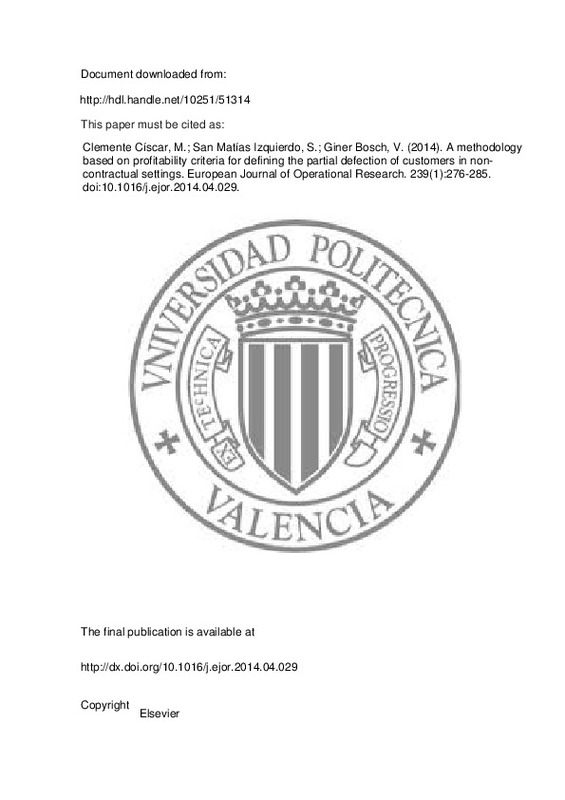JavaScript is disabled for your browser. Some features of this site may not work without it.
Buscar en RiuNet
Listar
Mi cuenta
Estadísticas
Ayuda RiuNet
Admin. UPV
A methodology based on profitability criteria for defining the partial defection of customers in non-contractual settings
Mostrar el registro sencillo del ítem
Ficheros en el ítem
| dc.contributor.author | Clemente Císcar, Mónica
|
es_ES |
| dc.contributor.author | San Matías Izquierdo, Susana
|
es_ES |
| dc.contributor.author | Giner Bosch, Vicent
|
es_ES |
| dc.date.accessioned | 2015-06-05T11:58:16Z | |
| dc.date.available | 2015-06-05T11:58:16Z | |
| dc.date.issued | 2014-11-16 | |
| dc.identifier.issn | 0377-2217 | |
| dc.identifier.uri | http://hdl.handle.net/10251/51314 | |
| dc.description.abstract | The defection or churn of customers represents an important concern for any company and a central matter of interest in customer base analysis. An additional complication arises in non-contractual settings, where the characteristics that should be observed to saying that a customer has totally or partially defected are not clearly defined. As a matter of fact, different definitions of the churn situation could be used in this context. Focusing on non-contractual settings, in this paper we propose a methodology for evaluating the short-time economic effects that using a certain definition of churn would have on a company. With this aim, we have defined two efficiency measures for the economic results of a marketing campaign implemented against churn, and these measures have been computed using a set of definitions of partial defection. Our methodology finds that definition maximizing both efficiency measures and moreover, the monetary amount that the company should invest per customer in the campaign for achieving the optimal solution. This has been modelled as a multiobjective optimization problem that we solved using compromise programming. Numerical results using real data from a Spanish retailing company are presented and discussed in order to show the performance and validity of our proposal. | es_ES |
| dc.language | Inglés | es_ES |
| dc.publisher | Elsevier | es_ES |
| dc.relation.ispartof | European Journal of Operational Research | es_ES |
| dc.rights | Reserva de todos los derechos | es_ES |
| dc.subject | Marketing | es_ES |
| dc.subject | Churn analysis | es_ES |
| dc.subject | Non-contractual retailing | es_ES |
| dc.subject | Cost benefit analysis | es_ES |
| dc.subject | Multiobjective optimization | es_ES |
| dc.subject.classification | ESTADISTICA E INVESTIGACION OPERATIVA | es_ES |
| dc.title | A methodology based on profitability criteria for defining the partial defection of customers in non-contractual settings | es_ES |
| dc.type | Artículo | es_ES |
| dc.identifier.doi | 10.1016/j.ejor.2014.04.029 | |
| dc.rights.accessRights | Abierto | es_ES |
| dc.contributor.affiliation | Universitat Politècnica de València. Departamento de Estadística e Investigación Operativa Aplicadas y Calidad - Departament d'Estadística i Investigació Operativa Aplicades i Qualitat | es_ES |
| dc.description.bibliographicCitation | Clemente Císcar, M.; San Matías Izquierdo, S.; Giner Bosch, V. (2014). A methodology based on profitability criteria for defining the partial defection of customers in non-contractual settings. European Journal of Operational Research. 239(1):276-285. doi:10.1016/j.ejor.2014.04.029 | es_ES |
| dc.description.accrualMethod | S | es_ES |
| dc.relation.publisherversion | http://dx.doi.org/10.1016/j.ejor.2014.04.029 | es_ES |
| dc.description.upvformatpinicio | 276 | es_ES |
| dc.description.upvformatpfin | 285 | es_ES |
| dc.type.version | info:eu-repo/semantics/publishedVersion | es_ES |
| dc.description.volume | 239 | es_ES |
| dc.description.issue | 1 | es_ES |
| dc.relation.senia | 268896 |







![[Cerrado]](/themes/UPV/images/candado.png)

